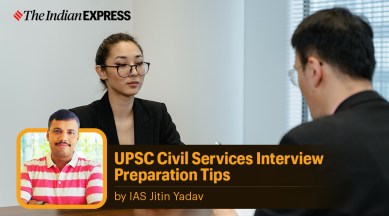How to handle tricky questions in UPSC Civil Services interview, IAS Jitin Yadav explains
The personality test is conducted to test the interpersonal skills, temperament, and confidence of a candidate to join the public services. Therefore, at times the interview panel might engage candidates in tricky questions.

In the Civil Services personality test conducted by the Union Public Service Commission (UPSC), the interview panel interacts with a candidate on diversified matters from international relations to political scenarios as well as personal information. During the course of the UPSC interview, a candidate might encounter uncomfortable or tricky questions.
Indian Administrative Service (IAS) officer Jitin Yadav says to handle such situations, one must learn the art of using smart language and understand the psychology behind such questions. “Certain questions answered with open-ended statements can lead to a chain of further questions. Therefore, it is important that candidates only use such words, statements and quotes in their answers which they can defend in trailing questions,” explains Yadav.
The skill of answering questions
The personality test is conducted to test the interpersonal skills, temperament, and confidence of a candidate to join the public services. Therefore, at times the interview panel might engage candidates in tricky questions.
“It is important that candidates do not lose their calm in such circumstances. In case of factual questions, if a candidate fails to recall the answer, it is recommended that they should seek permission to recall and should not put in more than 10-15 seconds to recollect. In case one doesn’t remember the answer, it is suggestive, to be honest with the panel. It is better to not make a guess if the topic is unknown or hard to recall,” elaborates Yadav.
“However, in situations where one is not sure of the answer, they can seek permission from the interview board to take a guess. The board doesn’t expect a candidate to know answers to all questions, however, they test a candidate’s confidence while facing unforeseen circumstances,” he adds.
Smart language
“Sometimes a panel member counters a candidate’s answer by denying its accuracy. If a candidate is certain about their answer, the best way to defend themselves would be ‘I strongly feel my answer is correct but I will cross-check it once I go back’. If you are unsure about the answer, it is better to admit it than argue. A candidate, under all circumstances, should refrain from engaging in a splutter with the interview panel,” says Yadav.
“Phrases like ‘I am not sure but if you allow I will like to take a guess, ‘please allow me a few seconds to recall’, ‘I might have to recheck this topic once I go back’ should be incorporated in the conversation with the interview panel,” he highlights.
Constitution as the guiding light
“While answering questions related to an ethical dilemma, a candidate should always hold the basic tenets of the Indian Constitution supreme. The Constitution should be considered as a guiding principle for all factual and ethical questions. The candidate should understand the psychology behind every question asked in the interview. The panel tests the decision-making abilities of a candidate while asking moral dilemma questions,” says Yadav.
“Apart from this, candidates should always have logical and practically possible answers. Any statement which upholds the fundamentality of the Constitution or of basic human rights should be avoided. As a future civil servant, the panel expects a candidate to be empathetic yet aware of his duties and responsibilities,” he emphasised.